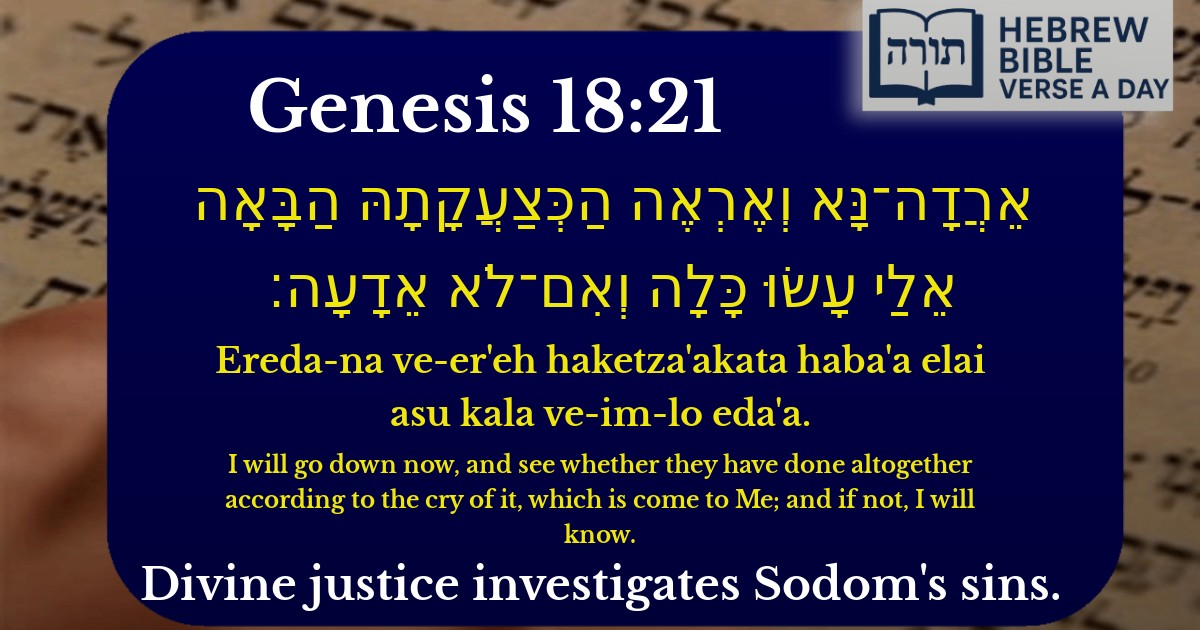Join Our Newsletter To Be Informed When New Videos Are Posted
Join the thousands of fellow Studends who rely on our videos to learn how to read the bible in Hebrew for free!
Hebrew Text
אֵרֲדָה־נָּא וְאֶרְאֶה הַכְּצַעֲקָתָהּ הַבָּאָה אֵלַי עָשׂוּ כָּלָה וְאִם־לֹא אֵדָעָה׃
English Translation
I will go down now, and see whether they have done altogether according to the cry of it, which is come to Me; and if not, I will know.
Transliteration
Ereda-na ve-er'eh haketza'akata haba'a elai asu kala ve-im-lo eda'a.
Hebrew Leining Text
אֵֽרְדָה־נָּ֣א וְאֶרְאֶ֔ה הַכְּצַעֲקָתָ֛הּ הַבָּ֥אָה אֵלַ֖י עָשׂ֣וּ <small>׀</small> כָּלָ֑ה וְאִם־לֹ֖א אֵדָֽעָה׃
אֵֽרְדָה־נָּ֣א וְאֶרְאֶ֔ה הַכְּצַעֲקָתָ֛הּ הַבָּ֥אָה אֵלַ֖י עָשׂ֣וּ ׀ כָּלָ֑ה וְאִם־לֹ֖א אֵדָֽעָה׃
🎵 Listen to leining
Parasha Commentary
📚 Talmud Citations
This verse is quoted in the Talmud.
📖 Sanhedrin 39b
The verse is referenced in a discussion about divine justice and the nature of God's knowledge and intervention in human affairs.
📖 Berakhot 62b
The verse is mentioned in the context of discussing God's omniscience and the concept of divine descent to investigate human actions.


Divine Justice and Investigation
The verse (Bereshit 18:21) describes Hashem's decision to investigate the sins of Sodom before executing judgment. Rashi explains that this teaches the principle of din emet l'amito (true and exact justice) – that even when the outcry against Sodom was great, Hashem did not judge them without first verifying their deeds. This reflects the Divine attribute of justice, where punishment is never meted out without thorough examination.
The Meaning of "Eredah Na" (I Will Go Down Now)
Ramban notes that the phrase "Eredah Na" indicates Hashem's direct involvement in judgment, rather than delegating it to angels. The Midrash (Bereshit Rabbah 49:6) elaborates that this demonstrates Hashem's personal engagement in justice, as the sins of Sodom were so severe that they required direct Divine intervention.
The Cry of Sodom
The term tze'akah (cry) is significant. The Talmud (Sanhedrin 109a) explains that this refers to the cries of victims oppressed by Sodom's wickedness, particularly their cruelty to strangers and the poor. Rashi adds that this cry had "come before Me" – indicating that their sins had reached a threshold demanding judgment.
"Asu Kalah" – Whether They Have Done Altogether
"V'im Lo Ede'ah" – And If Not, I Will Know
Rashi explains this phrase to mean that if their sins were not as complete as reported, Hashem would withhold full punishment in accordance with their actual deeds. The Kli Yakar adds that this demonstrates Hashem's precision in judgment – even evil cities are not destroyed without exact measurement of their sins.